The eye link
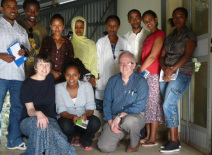
In Yirga Alem eye department
Eye diseases in Ethiopia are much more frequent and severe than in Wales but there are 100 times fewer ophthalmologists. Eye care delivery in Ethiopia is very dependent on trained ophthalmic nurses and optometrists.
For 5 years up until 2013 the Stanley Eye Unit in North Wales had a link with Yirga Alem Eye Department in Southern Ethiopia - see picture opposite - but the link has now shifted to Hawassa University hospital. This was because latterly there was insufficient management support for the link with Yirga Alem and the ophthalmologist from Yirga Alem moved to Hawassa to lead the Paediatric eye unit there. We felt Stanley Eye Unit could offer better support in paediatric eye care and general ophthalmology at Hawassa and we have signed a memorandum of understanding to this effect.
For 5 years up until 2013 the Stanley Eye Unit in North Wales had a link with Yirga Alem Eye Department in Southern Ethiopia - see picture opposite - but the link has now shifted to Hawassa University hospital. This was because latterly there was insufficient management support for the link with Yirga Alem and the ophthalmologist from Yirga Alem moved to Hawassa to lead the Paediatric eye unit there. We felt Stanley Eye Unit could offer better support in paediatric eye care and general ophthalmology at Hawassa and we have signed a memorandum of understanding to this effect.
Teaching and training
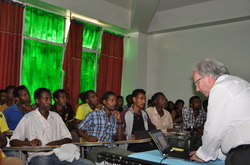
Teaching trainee optometrists
On every visit we provide teaching and training for students in Ethiopia, and also learn a great deal about conditions rarely seen in the UK, such as trachoma. Most recently, in March 2013 a team visited Hawassa University Hospital and were able to give a programme of teaching to trainee optometrists. This was both classroom and clinic based teaching and was very well received. We feel that teaching is a major way in which we can help to reduce avoidable blindness in Southern Ethiopia. Our link is a Vision 2020 link i.e. it was facilitated by Vision 2020 an organisation that seeks to eliminate avoidable blindness by the year 2020. In Ethiopia 80% of blindness is avoidable or treatable. Major causes of blindness are cataract, trachoma, glaucoma and diabetic retinopathy.
In addition we fund visits for the Ethiopia staff to come to Wales. During her last visit Dr Emebet received training in glaucoma surgery, paediatric ophthalmology and use of lasers.
In addition we fund visits for the Ethiopia staff to come to Wales. During her last visit Dr Emebet received training in glaucoma surgery, paediatric ophthalmology and use of lasers.
Retinoblastoma - a special problem
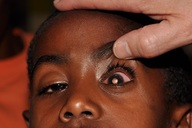
Retinoblastoma in a young child
Retinoblastoma is an ocular tumour of childhood which can now be treated effectively in the UK in the vast majority of cases. This is not the case in Africa where most children do not survive the disease. It seems that there is an increased rate of retinnoblastoma in Ethiopia and Eastern Africa.
During our short recent visit we saw 4 children with advanced stages of the disease and so we are keen to support the development of a retinoblastoma strategy for Ethiopia which will include increasing public awareness and the use of chemotherapy as treatment. If this could be established in Hawassa it would be a big step forward.
During our short recent visit we saw 4 children with advanced stages of the disease and so we are keen to support the development of a retinoblastoma strategy for Ethiopia which will include increasing public awareness and the use of chemotherapy as treatment. If this could be established in Hawassa it would be a big step forward.
Shashamene blind school
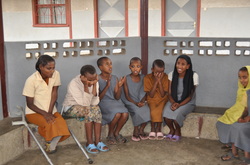
Our link also includes nearby Shashamene blind school where blind children receive excellent care and education but the staff are struggling because of very limited resources. We have committed to sending a regular sum to support their work.
This blinds school is run by 3 Catholic nuns but is open to children all faiths and none. There are about 80 children who have a well organised timetable of educational and leisure/ sporting activities. They learn to read Braille and some go on to higher education.
The school struggles to provide basic food and clothing and has recently had to restrict intake. We feel the school plays a vital role in maximising the potential of blind children in this part of Ethiopia and deserves extra support.
This blinds school is run by 3 Catholic nuns but is open to children all faiths and none. There are about 80 children who have a well organised timetable of educational and leisure/ sporting activities. They learn to read Braille and some go on to higher education.
The school struggles to provide basic food and clothing and has recently had to restrict intake. We feel the school plays a vital role in maximising the potential of blind children in this part of Ethiopia and deserves extra support.
Funding the link
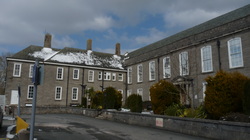
Stanley Eye Unit in Abergele Hospital, North Wales
We are very grateful for the support we receive through the Wales for Africa Health Links grant funding programme operated by the Welsh Government
The team at Stanley Eye Unit have been active in a number of fund raising events. Most recently on July 12th 2013 we held a disco dance at Prestatyn Golf club where we said goodbye in style to our trainees and in the process raised £470.
Funds raised are used to pay for visits to Ethiopia largely for teaching but also delivering some equipment. We are currently supporting Shashamene blind school and this year helping 3 ophthalmic staff with a visit to Kenya for education in retinoblastoma.
The team at Stanley Eye Unit have been active in a number of fund raising events. Most recently on July 12th 2013 we held a disco dance at Prestatyn Golf club where we said goodbye in style to our trainees and in the process raised £470.
Funds raised are used to pay for visits to Ethiopia largely for teaching but also delivering some equipment. We are currently supporting Shashamene blind school and this year helping 3 ophthalmic staff with a visit to Kenya for education in retinoblastoma.
